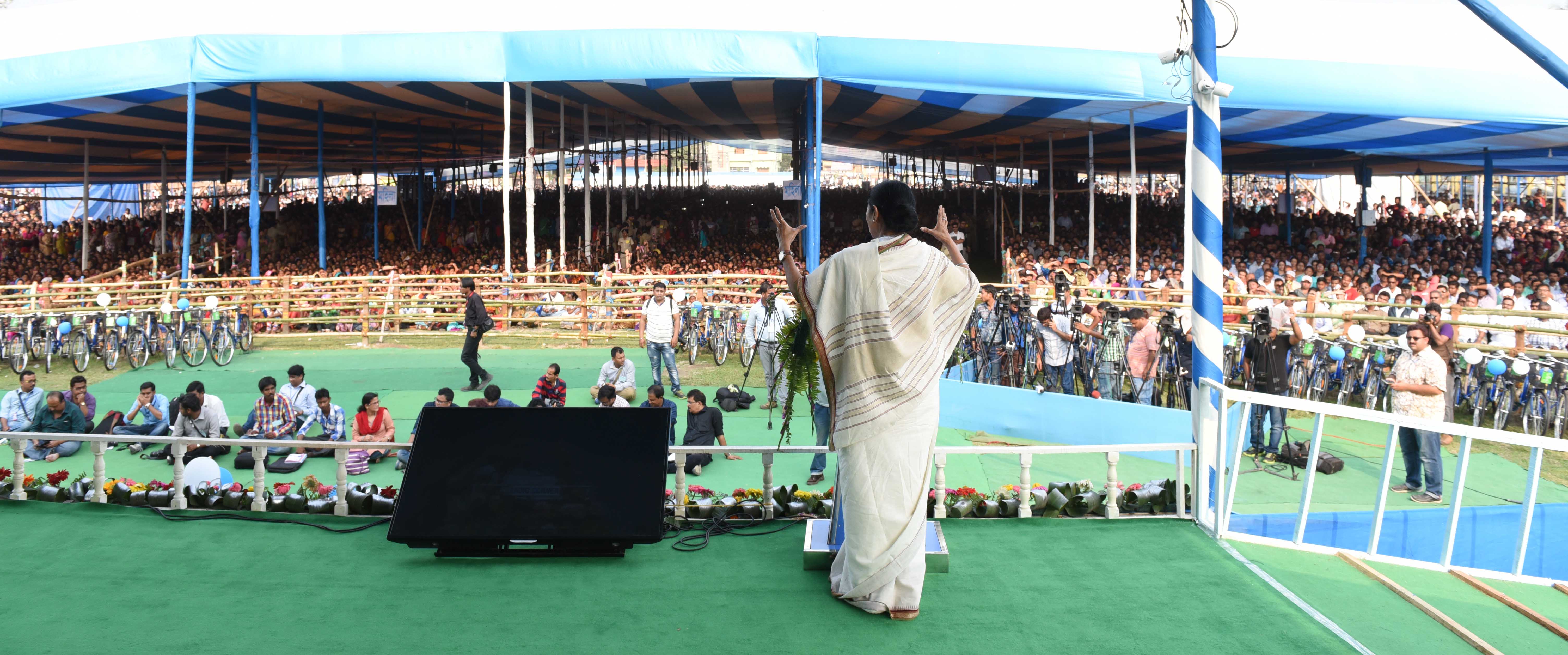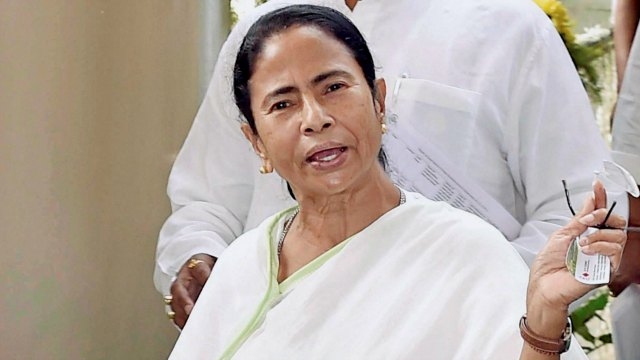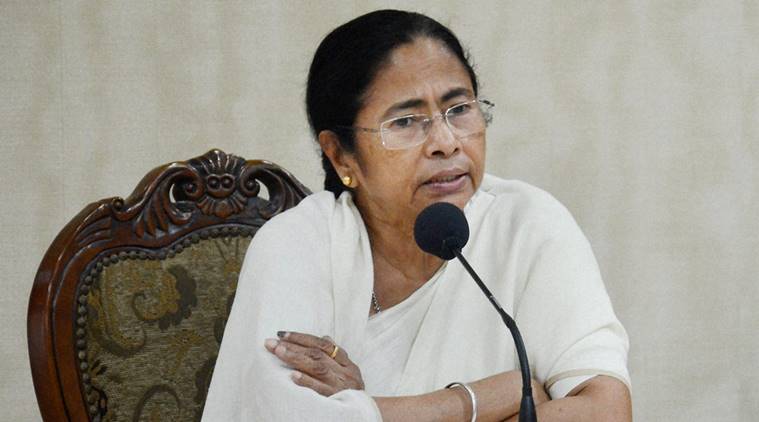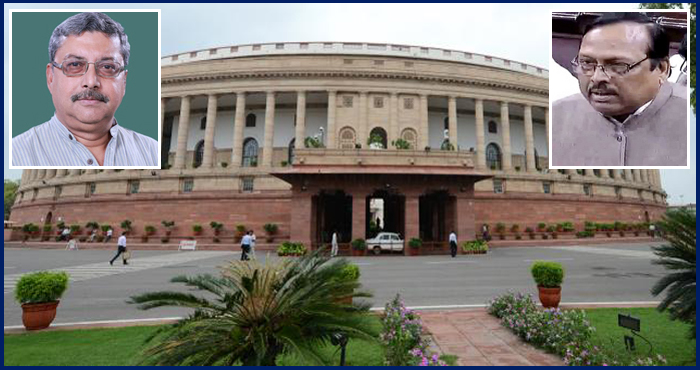Sir, kayee saal pehle, main Pakistan giya tha. Wahan mere Pakistani dost ne poocha, “Pichlay paanch hazaar saalon main, woh kaun si ek kitaab hai jo sabse samaaveshi, adarshvaadi aur samtavaadi hai?”
Sir, my Hindi was so bad I could not answer his question. So he tried the same words in Urdu and my Urdu is almost zero. The exact words he used were “Sabse aala, yak tab kati aur sabse jamah.” I did not have the answer.
Sir, so he asked the same question in English. My Pakistan friend asked which is the most inclusive, most idealistic, most egalitarian book written in the last 5000 years. And, he answered in Urdu – Dastoor-e-Hind. Bharat ka Samvidhaan, the Constitution of India.
Sir, this simple story pays our Constitution a great compliment. Today is not the day to try and be regional. I was very tempted to start by saying that the first four signatures, if you look at the draft of the Constitution, were those of Dr Sarat Chandra Bose, Dr BR Ambedkar, Kiran Shankar Roy and the great lawyer, Frank Anthony. The first four names were all sent to the Constituent Assembly from the State of Bengal, where I come from.
Sir, the Americans have the shortest Constitution of four thousand odd words. We have the longest Constitution in the world – one lakh 11 thousand 369 words. That’s a lot of words, Sir. We were the twenty-fifth country to get a Constitution and we would have inspired one hundred and fifty after us who got their constitutions.
Sir, but more than the words, sometimes films tend to capture the mood even better. Sir, 15 years ago, there was a very nice film made on Dr Ambedkar. It was a biopic and if you look through the credits of that film, the screenwriter of that film was Sooni Taraporevala, from the minority Parsi community. The director of the film was a staunch Hindu from Maharashtra – Jabbar Patel, and the role of Ambedkar was played by the legendary Muslim Malayalee actor, Mammooty. I must say that sometimes films have their own stories to tell.
And, before I move on to make some specific comments on the Constitution, how we fared in the last 65 years, we would also like to recall, on the behalf of the Trinamool Congress, on this happy occasion, the tremendous contribution Dr Ambedkar has had beyond the Constitution. For one, the Ph D thesis he wrote was the basis of the Finance Commission today. A paper he wrote is the basis of the RBI and the book, The Problem of the Rupee is the outline of the guidelines for the RBI Act.
Sir, this is a great occasion to celebrate, this is a great occasion to commemorate, but I think this is a great occasion also for, some reflection.
Sir, there are two points which I wish to leave behind here. Sir, twenty years before the Constitution, the great Mulk Raj Anand wrote a book which we had read in school called Untouchable. Sir, Mulk Raj Anand’s story, written in the 1930s, told us a story about a day in the life of Bakha. Bakha was a young man from an ‘untouchable’ caste. Like generations of his ancestors before him, Bakha had no choice but to follow the caste of his ancestors and the occupation of his ancestors. So what did he have to do? He had to scrape the latrines of human faeces and the way this was done, it had to be first scraped and then put on to a basket on his head and invariably, some of those lumps of faeces would fall on his body.
Sir, could there be a more accursed occupation? Could there be a worst way to be condemned for life? Sir, the injustice which Mulk Raj Anand described was made even worse because the people in the community where Bakha would do his cleaning wouldn’t pay him much money and even shrink from his touch. Sir, the reason I bring this story of Mulk Raj Anand up today is because it has been 68 years since Independence, and 85 years since this book was written, but there are still more than one million Bakhas, one million manual scavengers in this country.
Sir, this is a reason to reflect, a reason to pause. Here, in the Rajya Sabha, as we debate, deliberate, legislate and sometimes, agitate, perhaps this is a reason to contemplate.
Sir, the second reflection is on the work ethics of the Constituent Assembly. Sir, they prepared this monumental document in two years, 11 months and 17 days, that is, under three years. How are we doing with our work ethic?
Sir, it has been 19 years and the Women’s Reservation Bill is still pending here, Sir. There are two ways of looking at it, Sir. You stand up and make a speech and say yes, we want the reservation bill, or you act. And, I think, we in the Trinamool Congress acted. We have 35% women members in the Lok Sabha – 12 out of 34. And we will urge more political parties across the spectrum, don’t wait for the Reservation Bill, but act. It’s the same with the GST. The Constitution took three years to do; the GST is taking us four years.
Sir, let us move on to something that the Leader of the House had spoken about and many esteemed speakers before me have referred to in the debates on the Constituent Assembly, and the great work which was done.
Sir, I want to go one step back. How was the Constituent Assembly formed in the first place in July-August, 1946? If you go back to the British Government of India Act 1935, the State legislatures had their own representations. Now, in 1946-47, when the Constituent Assembly was formed, these were indirectly elected from the States. That is why, all these great men and women, who were a part of this writing the Constitution were indirectly elected members. So, in a way they were precursors of this Rajya Sabha. That is the very basis of this Constitution. So, one gets very disturbed and saddened that a lawyer and an eloquent speaker like the Leader of the House, outside the House, makes statements demeaning this Rajya Sabha.
To quote the Leader of the House – “It is a serious question in a parliamentary democracy wherein bill after bill, the wisdom of a directly elected house is questioned by the indirectly elected house”.
I have to tell, through you Sir, to the Leader of the House, please do not indulge in ‘cowboy constitutionalism’. This is ‘cowboy constitutionalism’, because it does not suit you now. Because your party has fewer numbers than what you want to in the Rajya Sabha, you go back and question the basic foundation of our Constitution. Sir, this is ‘cowboy constitutionalism’ at its worst and this Government is getting a reputation for indulging ‘cowboy constitutionalism’.
Sir the second example of ‘cowboy constitutionalism’, I want to give you is, the number of ordinances which have been passed since Independence. For every 10 Bills passed and made into an Act under Pandit Nehru, one was an ordinance. You come to the 1970s, the Janata Party, for every 10 Bills passed, 1.6 Bills were an ordinance. You come to the UPA-I and II, for every 10 Bills passed, 1.9 Bills were an ordinance. What do the numbers say for NDA? In the last 15 months, for every 10 Bills passed, 3 were ordinances. The message is clear, stop indulging in ‘cowboy constitutionalism’.
Sir, battles over history are not uncommon in healthy democracy. So, when the leader of the Communist Party India, Marxist accuses the far right to worm their way into the Constitution, perhaps someone should first hold a mirror for him. Mr Yechury spoke in detail and looked for a certificate, which he finally got from the President of India in 1992, talking about the role of the Left. We all know, who read our history, what the Left were doing in’47, what the communists were doing after that in 1962. But I don’t want to indulge in rhetoric.
I have a quote here from a book Different Paths, One Goal: Communists and the Quit India Struggle. Four lines from EMS Namboodiripad and I quote from his book – “It is true that we did not participate in the struggle… we did commit the serious mistake of denouncing the leaders and participants in the Quit India struggle as agents of world fascism and Japanese militarism”.
This is one quote from no less a leader than Mr Namboodiripad. So, when I hear these stories about nationalism and the BJP trying to worm their way into the Constitution and the Freedom Movement, everyone is qualified to talk about it, but certainly not the Communist Party of India, Marxist.
Sir, in 1948, after the Constituent Assembly was formed and the drafting began, as we read in the history books, most of the drafting was done from 1948 to 1949, and the famous speech was made by Dr Ambedkar in November 1949. Sir, on the 30th January, 1948, a sad incident, a tragic incident occurred, one about which Pandit Nehru said, “the light has gone out of our lives.”
Sir, a few weeks after that incident, the then Home Minister of India, Vallabhbhai Patel, took a decision. What was his decision, Sir? He banned the RSS. This is very interesting. So even though the Communists had someone in the drafting committing making a few points or what I don’t know, but the RSS was banned in 1948.
Today is a great occasion where we need to find out what is the ideology in place – either we follow A or we follow B. I’ll come to B later. I have a quote here, Sir. This one is from Guru Golwalkar’s We, a Nationhood Defined: (only five lines, Sir, and this is quote from the book):
“The non-Hindu people in Hindustan must either adopt the Hindu culture and language, must learn to respect and revere Hindu religion, must entertain no idea but the glorification of Hindu nation…they must cease to be foreigners or may stay in the country wholly subordinated to the Hindu nation, claiming nothing, deserving no privileges, for less any preferential treatment, not even the citizen’s rights.”
Sir, these are not my words, these are Guru Golwalkar’s words. Now you come to September 2002. Another ideologue, or a modern-day ideologue, doesn’t have the same stature of, maybe, Guru Golwalkar. Sir, this is September 2002. I’m not getting into the details of 2002, not a good occasion, Sir, but this is the quote: “In India, Hindutva has more legitimacy than the Constitution,” S Gurumurthy, September 2002.
Sir, we did not hear these voices for ten-twelve years. These voices have again come up and come up and come up. But there is good news. In September 2014, just about 300 something days agao, Mamata Banerjee made a statement on the Constitution: “The Constitution is the only holy book of this great nation.”
On November 27, the Prime Minster said that the Constitution is the “only holy book” for this government. I wasn’t hearing his campaign speeches but I was hearing his Lok Sabha speech. Sir, the Prime Minister is here this afternoon to speak on this debate. This is a great and momentous occasion for him to either tell us whether he believes in A or B. Because A and B cannot work together, Sir. They cannot go together; they are miles and miles apart.
Sir, if you look through the Constitution, all one lakh eleven thousand words, you can’t find the word ‘federalism.’ It’s never mentioned there, Sir. But the first article clearly talks about India, that is, Bharat shall be a union of states.
Sir, we’ve already had so many debates on federalism, but I want to give one example only, and it is a pity that Mayawati is not here today because I thought of this only after she spoke. Devolution of funds. Twenty six funds, either they have been reduced, or the percentage between the Centre and the States have been flipped around. And for eight schemes, the Centre has stopped funding the States.
I don’t want to go into a technical accounting debate. One example is the BRGF, the Backward Regions Grant Fund. Sir, if you look, that has been stopped completely. Sir, in rural areas, 56% schedules castes/schedules tribes, 40% OBCs are beneficiaries of this scheme. On one hand you are celebrating Dr Ambedkar’s birth anniversary, and on the other hand you are taking away BRGF which is for the SCs, STs and OBCs. Sir, in the urban areas, there are 47% SC/ST, 9% OBC. So there are so many points in federalism – the NITI Aayog, the Planning Commission, the Prime Minister sometimes calling up the Chief Secretary, but let’s not bring the debate down with those details, suffice to say, talk about cooperative federalism but on the ground, stick to operative federalism.
Sir, my next point is secularism. Sir, if you go back to the origin of this word, it comes from Latin or Greek. In Latin or Greek, ‘seculum’ basically means that which is not church, or that which was not religion; anything of the world which was not about the church.
Sir, and we’ve got into a debate; the Home Minister made a statement on the floor of the Lok Sabha, and there have been countless statements which have been made outside. Sir, but what was missed out that day, the same day, the highest law officer of the land, three times when he read the Preamble or referred to the Preamble, in his speech on law day, he did not use the word ‘secularism’ or ‘secular.’ Was that a mistake? Was that the fringe or was that the mainstream? And the danger here is that the line separating the fringe and the mainstream are blurring, Sir. I propose, in the resolution which comes here, Sir, to please include the word ‘pluralism’, because that is very, very important.
Sir, the leader of the House took me back to history class, very interestingly, and I quote: “when constitutional systems are used to subvert the Constitution,” and he gave us the example of the Weimer Republic and Germany; step 1 – burn the Reichstag, Parliament, step 2 – muzzle the media, step 3 – lock up the opponents, step 4 – economic agenda.” Yes, I know he was alluding to the 1970s and some of my friends here may be a little queasy in their seats, but that is history, Sir. What caused us more concern was when he said about step 1, parliament hatao, step 2, muzzle the media; I think this was a perhaps the subconscious mind coming to light and that is why, perhaps, this Weimer Republic part of the Constitution is so stuck in the head. Is this a plan? But thankfully, this plan got scuttled after what happened in Bihar, and that’s why we’re here, Sir.
Sir, in conclusion, as our young men and women go across the world and make ourselves proud, we too, when we were making our Constitution, took so many ideas from across the world. The concepts of liberty, equality and fraternity were taken from the French; the concept of directive principles was taken from the Irish; some of the judicial concepts were taken from Japan, the concept of federalism was taken from Canada and Australia, and the Soviet Union gave us the Planning Commission. So this is beautiful, Sir.
Sir, I want to leave you with the thought; let me leave you with a constructive suggestion (because otherwise the cynicism of having this two- three day debate will always be there). Sir, for our young people between 18 and 30 (so they don’t feel we are only coming here and making speeches, and referring to a one lakh 13 thousand-word book, and not living the book, not breathing the reality), is a positive suggestion: next year, Sir, before we make our speeches, we propose to have, a CAM – Constituent Assembly Module. Set it up in Delhi, let young people between the ages of 18 and 30 come there and actually experience this module, where they can actually take up issues and discuss these issues, see how legislation is done.
Sir, this is an idea we want to leave behind, because as we say, Sir, we have to learn from the past, experience the present and prepare for the future.
Thank you, Sir.






